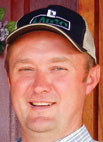
Bob Tanner uses Brahman bulls to produce Tigerstripe cattle
“God’s blessed me, and I give Him all the credit. I’ve had a variety of businesses in addition to the farm and have been successful because of His grace in spite of not having an education,” said Bob Tanner of Berryville, in Carroll County, Ark.
When Bob was 19, he purchased his first 40 acres because he could pay it out at $90 an acre with money he had saved from catching turkeys for 50 cents an hour in 1953, and later a job helping to build the Table Rock Dam at a $1.37 an hour. He was supposed to be at least 18, but was a shy of that and was pushing a labor crew before he was 23.
Then he went to Arizona for six years to work on the Glen Canyon Dam where he served an apprenticeship in structural ironwork becoming an iron worker superintendent at 22 with 300 people under him. During that time, he saved more money while his father Hildred took care of his land and cattle back home.
Bob married after returning home. He and his wife saved $12,000 to buy their first grocery store in Jasper. The business expanded to seven grocery stores intended to meet the needs of the more rural population. He maintained that grocery business for 54 years.
Bob’s current businesses include Tanner Pipe and Steel near Harrison and Bob’s Do It Best Hardware in Jasper. Through the years, Bob has developed a fairly substantial cow/calf operation in which he is now experimenting with Brahman lines. He likes Tigerstripes because the breed tends to be rugged, to provide good milkers, to tolerate heat well and most of the time produces calves that weigh 100 to 120 pounds more. When calves are born, they are ear tagged and matched to the momma, with bull calves being banded.
“I like banding because it’s easier on them as well as us,” said Bob.
Bob typically weans at 6 months, when the calves weigh 550 pounds, and feeds a 12 to 15 percent protein ration, in addition to a variety of mineral, making sure to add magnesium in the spring. He typically sells his calves at more than 700 pounds, but watches the market for the best opportunity in either Harrison or Green Forest.
“Through all my years in business and the cattle industry, I have made a point of treating people the way I want to be treated and selling locally is just one of those ways. I have always tried to give the community what it needs. It’s a win-win for everybody,” Bob said.
Bob has some registered Brahman bulls, which he breeds to Herefords, which is now “turning into a pretty good herd.”
He feeds a few cubes every day and finds the cattle willingly led into working pens. Cows and bulls are only fed grain in extreme conditions and are therefore mostly grass and hay fed. However, Bob does supplement in winter with corn syrup he buys by the truckload to maintain cattle energy during the colder months. Two bulls are kept with each herd of 50 females and rotated to keep the bulls strong and the genetics clear. Further, Bob likes to raise his own replacement heifers and selects those to keep according to milk production genetic records. Cows are culled when they lose a calf or quit producing.
He and full-time ranch hand Sonny Villines work the cattle themselves, though at 78 he mostly looks out the window because of a bad knee. The cattle are wormed twice a year varying methods and products to prevent resistance. At those times the cattle are also given all the necessary shots and calves dehorned.
Sore feet are something he and Sonny watch for because of the local terrain. They are still looking for a better solution when soreness shows up because if treated early, the treatment can be very successful but they don’t always catch it soon enough.
Predators are a problem and Bob suspects coyotes are the main culprits, especially when cows are calving. Bob uses donkeys, but finds they are only partially successful.
Pasture maintenance includes spreading locally-purchased chicken litter, because commercial is too expensive, and spraying for weeds with boom and nozzle sprayers filled with a variety of brands and types. Different weeds are prevalent at different times such as carrot weed popping up in the spring. Fortunately, most of the thistles are gone so spot spraying is necessary only occasionally. Since Bob has multiple pieces of construction equipment, he is always clearing more land and fighting a relentless battle against blackberries. He clears and angle blades the land before seeding. Currently his pastures contain too much Bermuda so he is planning on overseeing with a cool weather no till rye that works best for him.
Though perhaps not to fondly, Bob clearly remembers milking Jerseys and Guernseys when a youngster, then separating the cream by hand. When the whey was returned to them, it was mixed with grain to create a then popular mix called blue john which was subsequently fed to their pigs.
“If you can’t eat it or spend it, you don’t need it,” Bob said with a laugh as he looked away from his herd. “The key to success is self-confidence, determination and a good line of credit.”






